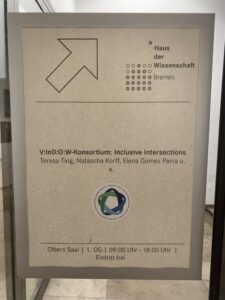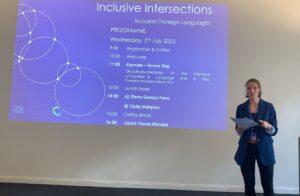Conference
The networks In+ and AILA ReN “INCLUSIVE FOREIGN LANGUAGE EDUCATION” as well as the Erasmus+ „V:In:D:O:W“ Project Team held the scientific conference:
Inclusive Intersections
Holding the mirror of inclusion to subject content during initial and in-service foreign language teacher education
in Bremen, Germany 4-7th July 2023
—— Download the program here: Inclusive Intersections_Flyer_31052023 —–
Description of the event
European educational policy makers envision the development of communicative competence as the main goal of institutionalized foreign language (FL) education (Council of Europe, 2001) and hope for the realization of the Barcelona Summit (2002) “mother tongue + 2” objective. Yet, the relatively long list of various subcompetences, types of knowledge and affective variables that communicating in a foreign language encompasses, highlights how complex and multidimensional the process of learning a foreign language can be and, therefore, how difficult it is for everyone to learn foreign languages easily, in a comparable manner and with similar success. In fact, learning a foreign language can often prove challenging for learners.
 Since the ratification of the UN Convention on the Rights of Persons with Disabilities (UN CRPD) the implementation of inclusive education systems that enable all learners to actively engage in learning and reach their potential is a goal recognized by all European Countries. However, on a practical level, not all educational systems and not all agents within them are truly ready to realize such task in practice. Especially considering the assumption that pre-service teachers need to be ready to teach in inclusive school systems, it seems necessary to provide them with appropriate education and training during their studies. Yet, this is often not the case – especially the link between subject teaching methods and inclusive educational approaches is often missing, although the interlocking of these fields is highly important for the teaching practice: in a survey of student teacher’s course catalogues Frohn & Moser (2021) show that while almost all universities included in the study indicated that they had courses on inclusion, these were often not focused on inclusive provision of subject content.
Since the ratification of the UN Convention on the Rights of Persons with Disabilities (UN CRPD) the implementation of inclusive education systems that enable all learners to actively engage in learning and reach their potential is a goal recognized by all European Countries. However, on a practical level, not all educational systems and not all agents within them are truly ready to realize such task in practice. Especially considering the assumption that pre-service teachers need to be ready to teach in inclusive school systems, it seems necessary to provide them with appropriate education and training during their studies. Yet, this is often not the case – especially the link between subject teaching methods and inclusive educational approaches is often missing, although the interlocking of these fields is highly important for the teaching practice: in a survey of student teacher’s course catalogues Frohn & Moser (2021) show that while almost all universities included in the study indicated that they had courses on inclusion, these were often not focused on inclusive provision of subject content.
During this conference, we aimed to focus on approaches and concepts for the training and further education of (prospective) teachers, which provide inclusive approaches and concepts for the design of foreign language teaching. In terms of content, a distinction was be made between approaches to in- and pre-service teacher education.
Conference organization team:
- Michele Daloiso (University of Parma)
- Maria Elena Gómez Parra (University of Córdoba)
- Małgorzata Baran-Łucarz (University of Wrocław)
- Joanna Pfingsthorn (University of Bremen)
- Julia Weltgen (University of Bremen)
- Heiner Böttger (Catholic University of Eichstätt-Ingolstadt)
- Bianca Höppner (Catholic University of Eichstätt-Ingolstadt)




